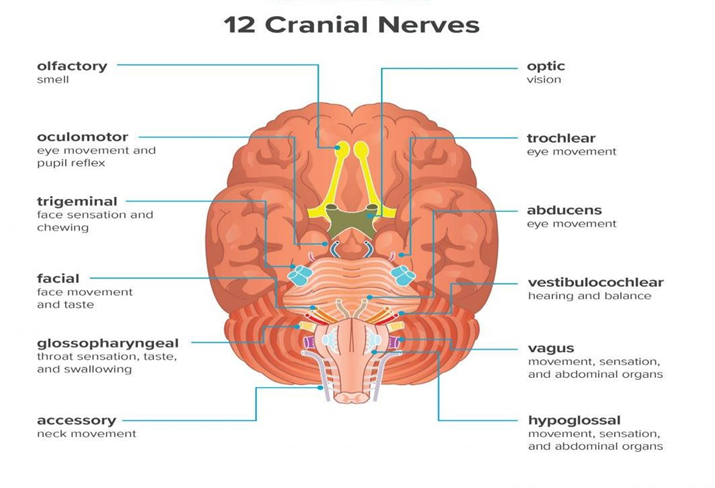A nurse is performing a cranial nerve assessment on a client following a head injury. Which of the following findings should the nurse expect if the client has impaired function of the vestibulocochlear nerve (cranial nerve VIII)?
Inability to smell
Loss of peripheral vision
Disequilibrium with movement
Deviation of the tongue from midline
The Correct Answer is C
C. The vestibulocochlear nerve is responsible for both the vestibular function and the cochlear function. Impaired function of the vestibulocochlear nerve could result in symptoms related to vestibular dysfunction, such as disequilibrium (feeling unsteady or off balance) especially with movement.

A. The olfactory nerve (cranial nerve I) is responsible for the sense of smell.
B. Loss of peripheral vision is typically associated with impairment of the optic nerve (cranial nerve II), which is responsible for vision.
D. Deviation of the tongue occurs in injury to the hypoglossal nerve.
Nursing Test Bank
Naxlex Comprehensive Predictor Exams
Related Questions
Correct Answer is C
Explanation
Dehydration can lead to a decrease in blood volume and subsequent hypotension (low blood pressure) as the body tries to conserve fluid.
A, B, D are features of fluid overload.
Correct Answer is C
Explanation
C. Stridor is a high-pitched, crowing sound that occurs during inspiration and indicates upper airway obstruction. Stridor following extubation is a concerning finding and requires immediate intervention to ensure adequate airway patency and prevent respiratory compromise. The nurse should notify the healthcare provider immediately and be prepared to provide interventions such as airway suctioning, supplemental oxygen, or reintubation if necessary.
A. While a sore throat is a common complaint after extubation due to irritation from the endotracheal tube, it does not typically require immediate intervention unless it is severe or accompanied by other concerning symptoms. The nurse should provide comfort measures and monitor for worsening symptoms.
B. An SPO2 of 92% is within normal rage and requires no immediate intervention.
D. While rhonchi may require intervention, they are not typically as immediately concerning as stridor, which indicates upper airway obstruction.
Whether you are a student looking to ace your exams or a practicing nurse seeking to enhance your expertise , our nursing education contents will empower you with the confidence and competence to make a difference in the lives of patients and become a respected leader in the healthcare field.
Visit Naxlex, invest in your future and unlock endless possibilities with our unparalleled nursing education contents today
Report Wrong Answer on the Current Question
Do you disagree with the answer? If yes, what is your expected answer? Explain.
Kindly be descriptive with the issue you are facing.
